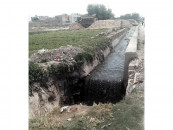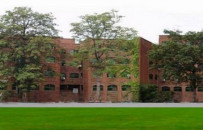Educated appeals: A lesson in primary education
PILER and civil society appeal to Supreme Court to implement compulsory education legislation.

The Pakistan Institute of Labour Education and Research (Piler), along with members of civil society have decided to initiate public interest litigation before the Supreme Court (SC) regarding compulsory primary education in all districts of the province.
Piler has appealed to the SC to issue a declaration to the federal and provincial governments to fulfil their obligations under the recently adopted 18th Constitutional amendment. “This involves ensuring free and compulsory education to all children from the ages of five to sixteen and also imposes a fine or imprisonment for parents who refuse to send their children to school,” said Piler senior research associate Zeenia Shaukat.
The Piler staff pointed out that according to the newly inserted Article 25A of the Constitution, the ‘Right to Education’ was now a fundamental right and no longer an arbitrary entitlement. Shaukat said that primary education was of the utmost importance for the development and future of the country. “We cannot afford to ignore or deflect the issue any longer. Education must be provided at all costs and if that means that we now must enforce the law in this regard then so be it,” she said. Piler staff cited a recent example where the DCO of Bhakkar had implemented the legislation by conducting a door-to-door survey in the district and registering all children who were not in school. “Now that schooling and books are free there is simply no excuse for children not being in school and those that aren’t ought to be registered and dealt with by the Child Protection Bureau (CPB),” she said.
The newly drafted petition points out that “Pakistan, from its very inception, has paid scant attention to the most fundamental contribution to human development: universal education. Apart from being the main source of human capital formation, education equips a nation to steer a country’s economy towards the path of sustainable development, promotes informed consent and fosters social harmony, peace and democratic values.” This clause has been referred to repeatedly throughout the appeal. “We hope that the SC will make it mandatory for district officers and local government to enforce the compulsory education legislation to ensure that child labour and beggary can be eliminated,” said Piler volunteer Majid Kamran.
Pakistan presents a pathetic picture in the global index for education. Pakistan has 70 million children in the age group of five and 19, out of which only 27.9 million are presently enrolled in schools. With a literacy rate of 49 per cent that includes many who can only sign their names, 42 million or 60 per cent of the population of school-going age is unable to access any means of education.
“The country ranks 163rd out of 177 countries on the UN index of education systems. One in ten of the world’s out-of-school children are Pakistani. Pakistan also has the highest dropout rate with hardly 10 per cent of the population completing twelve years of schooling. Low enrolment rates at the primary level, wide disparities between regions and gender, lack of trained teachers, deficiency of proper teaching materials and poor physical infrastructure mark the educational system of the country”, the petition adds.
According to the petition, the state is the largest provider of education service in the country, serving 19 million or two thirds of the almost 28 million children enrolled in schools. Private education system caters to merely 9.1 million or 33 per cent of school children. Viewed in this context, the quality of education in the country indicates the Pakistani state’s failure in fulfilling its constitutional obligation of providing fundamental service to the citizens.
A recent report, ‘Education Emergency in Pakistan’ reveals that only 35 per cent of school children, aged 6-16, can read a story, while 50 per cent cannot read a sentence. Their performance is only slightly better than that of out-of-school children, of whom 24 per cent can read a story. This is an alarming demonstration of the ineffectiveness of schooling, particularly the state schooling system. “The fact of the matter is that we first need to ensure that children are in school and then work on how to teach them. It sounds simple but on a practical level it is a mammoth task. Once enough children are in the public school system we can put enough pressure on the government to improve the syllabus and the teaching standards,” said Kamran.
In its role as a manager of resources too, the Pakistani state’s failure is evident in the physical condition of schools that smack of utter disregard for human safety and security. According to a survey reported in the Education Emergency document, only 36 per cent of the public schools are judged to be in a satisfactory condition. 30,000 school buildings are damaged, posing a threat to the well being of children. Over 21,000 schools have no building whatsoever. 60 per cent of state schools have no electricity, 34 per cent have no drinking water and 23 per cent remain without textbooks.
“We need to take desperate measures and this must also coincide with child welfare and labour laws. Children who are not in school are often on the streets or working on their parents behalf,” Shaukat said. “We need door-to-door registration of children so we can pinpoint the ones not being sent to school and can then investigate,” she said.
The Constitution, recently amended under the consensus-backed process leading to the passage of the 18th Amendment, clearly binds the state, under Article 25A, ‘Right to Education’, for providing free and compulsory education to all children of the age five to sixteen. Under the 18th Amendment, education has now become a right and no longer an arbitrary entitlement.
As the new academic year sets in, the state must make efforts to expand the basic service, now a fundamental right, to all children of five to sixteen.
Piler employees said that they had appealed to the government to clearly state the penalties for not sending children to school. “People should be made aware that not sending children to school, when it is now free, is a punishable offence.
People employing children as labourers or servants should also know that their actions are punishable under the law,” she said. Shaukat said that awareness could only be raised on the issue if the state takes action. “The SC needs to implement and enforce this law so that people begin to take primary education seriously,” she said.
‘Make it manditory’
The appeal document states: “We, therefore, appeal to the honourable Supreme Court of Pakistan to direct the federal and provincial governments to submit a concrete plan to the Honourable Court and also make it public – under the Article 19A, the Right to Information Act - as to how they would and must ensure that: Every child of school-going age is enrolled in a proper school during the current educational year; allocation of adequate finances for this purpose is provided in the ensuing budget; devise mechanisms for effective utilisation of existing resources allocated for education; There is an uneven balance between the distribution of resources for higher education versus primary education, especially girls’ education. Higher education claims a large chunk of resources allocated for the sector.
Subsidies to higher education should be drastically curtailed in favour of tertiary education for females; the state’s inefficient, and at a number of places, non-functional education services should not be replaced with private education which is constantly being promoted by the state as a viable option.
Published in The Express Tribune, May 5th, 2011.



















COMMENTS
Comments are moderated and generally will be posted if they are on-topic and not abusive.
For more information, please see our Comments FAQ